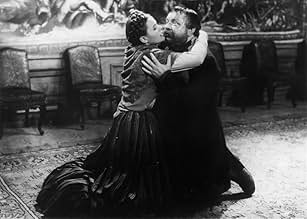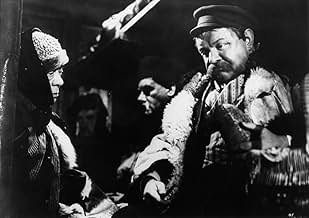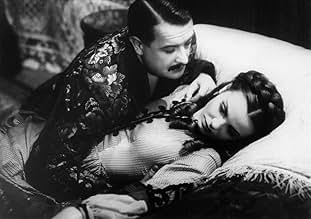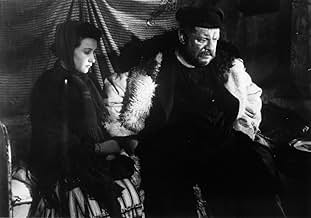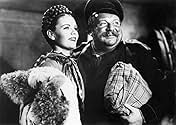PUNTUACIÓN EN IMDb
6,9/10
244
TU PUNTUACIÓN
Dos capitanes de la caballería rusa llegan a una estación de correos alemana y recuerdan como hace 10 años su compañero llegó a la misma estación, convenció a la hija del gestor de irse con ... Leer todoDos capitanes de la caballería rusa llegan a una estación de correos alemana y recuerdan como hace 10 años su compañero llegó a la misma estación, convenció a la hija del gestor de irse con él a San Petersburgo, y allí la abandonó.Dos capitanes de la caballería rusa llegan a una estación de correos alemana y recuerdan como hace 10 años su compañero llegó a la misma estación, convenció a la hija del gestor de irse con él a San Petersburgo, y allí la abandonó.
- Director/a
- Guionistas
- Estrellas
- Premios
- 1 premio en total
- Director/a
- Guionistas
- Todo el reparto y equipo
- Producción, taquilla y más en IMDbPro
6,9244
1
2
3
4
5
6
7
8
9
10
Reseñas destacadas
One cannot bargain with Fate.
Those who chance upon this film will have the privilege of watching one of the greatest performances by an actor to be captured on celluloid. Heinrich George in the title role surpasses even himself and ranks alongside Charles Laughton in 'Hunchback of Notre Dame', Emil Jannings in 'Der Lezte Mann' and Harry Bauer in 'Les Miserables'. Ironically Bauer played the role of the stationmaster in 'Nostalgie' two years earlier but as that film seems to have sunk without trace one is unable to compare.
Hilde Krahl is absolutely magnificent in this her 'breakthrough' role as Dunja who possesses what Byron called 'the fatal gift of Beauty' and is told by one of her lovers Minsky, played by the excellent Siegfried Breuer:'you pay a price for everything in life'. Indeed she does.
The production of this film is very interesting historically as it was made during the brief period between the signing of the non-aggression pact between Germany and Russia in 1939 and Germany's invasion of Russia in 1941. Needless to say after the outbreak of hostilities this film based upon a story by Pushkin would have been unthinkable.
This is probably Gustav Ucicky's greatest film. It won the Mussolini Cup in Venice and one would like to think this was due as much to its aesthetic qualites as to the politics of the time although his egregious propoganda film 'Heimkehr' was awarded the same prize the following year. What does that tell you?
As a postscript Ruth Heilberg who has the thankless part of Dunja's faithful friend, was married at the time to actor/director Wolfgang Liebeneiner. They divorced in 1943 and the following year Liebeneiner married.... yes, you've guessed it, Hilde Krahl!
Heinrich George, as is well documented, died in a Soviet prison camp in 1946 and was buried in an unmarked grave. He certainly paid the price.
Vater und Tochter
Germany 1940: the legendary directors have departed : Fritz Lang,Robert Siodmak,Detlef Sierck (Douglas Sirk)...
A first version of this Russian story was made in France starring Harry Baur in the thirties,but the German version is generally considered best of all including a third one ,"Dunja" ("Dunja" is the name of the heroine.)
"Der Postmeister" is not unworthy of the melodramas Sierck made with Zarah Leander ("La Habanera");melodramas buff should definitely watch it.
It contains scenes you would not expect from the Nazi years ;the most amazing is an astounding dance of a topless gypsy (you read well);the scene when the father explains to her daughter that he did not behave decently with her mother who closed her bedroom ;the wedding and the feast (what kind of beast could attend such a feast?)just to fool the poor father whose only purpose in life is to see his daughter happy;the young officer telling to a distraught Dunja how much he despises those gals you've got to pay for sex;the same going crazy when he discovers he's been betrayed (just look at his eyes:impressive!);an unusually inventive editing when papa returns home ,leaving her girl to despair whereas he thinks she's the happiest girl in the world...
Dunja has many relatives in the world of cinema:from Pabst' s "Loulou" to Renoir/Zola's "Nana".
A first version of this Russian story was made in France starring Harry Baur in the thirties,but the German version is generally considered best of all including a third one ,"Dunja" ("Dunja" is the name of the heroine.)
"Der Postmeister" is not unworthy of the melodramas Sierck made with Zarah Leander ("La Habanera");melodramas buff should definitely watch it.
It contains scenes you would not expect from the Nazi years ;the most amazing is an astounding dance of a topless gypsy (you read well);the scene when the father explains to her daughter that he did not behave decently with her mother who closed her bedroom ;the wedding and the feast (what kind of beast could attend such a feast?)just to fool the poor father whose only purpose in life is to see his daughter happy;the young officer telling to a distraught Dunja how much he despises those gals you've got to pay for sex;the same going crazy when he discovers he's been betrayed (just look at his eyes:impressive!);an unusually inventive editing when papa returns home ,leaving her girl to despair whereas he thinks she's the happiest girl in the world...
Dunja has many relatives in the world of cinema:from Pabst' s "Loulou" to Renoir/Zola's "Nana".
Gem of Intriguing Subtlety and Thought Provoking Human Relations
Considering all the historical background while DER POSTMEISTER was being made, one may rightly draw conclusion that best works came out having been polished by obstacles and efforts. As the reviewer before me has accurately pointed out that 1940 saw the best directors of Austrian/German cinema gone (Robert Von Dassanowsky memorably refers to this period in his book AUSTRIAN CINEMA), we cannot equal that fact with a thoroughly hopeless cinema doomed to destructive monstrosity of propaganda. DER POSTMEISTER proves to be one of the exceptions from the propaganda pressure.
Although preceded by another screen adaptation and succeeded by a remake, Gustav Ucicky's DER POSTMEISTER is a top notch production. Resulting from an in-depth knowledge of audiences' expectations (Ucicky, director of HEIMKEHR, proved good rapport with producers Karl Hartl and Erich Von Neusser), DER POSTMEISTER set the right tone for the standards of the time at two basic levels. On the one hand, it was a correct product of the period (Alexander Puschkin's STANCJONNYJ SMOTRITEL was a right Russian literary source within the Molotov–Ribbentrop Pact, later a winner of the Mussolini Cup at the Venice Festival); on the other hand, the film appeared to be ahead of its time, which made it embrace all aesthetic and social aspects. Therefore, today, DER POSTMEISTER may still be viewed as one of the most important films by movie scholars who attempt at learned approach as well as film freaks who aim at aesthetic viewing experience of high quality silver screen production.
The aesthetic value of the movie occurs to be one of its most remarkable features. Full credit to the cinematographer Hans Schneeberger! Combining innovative elements of German Expressionism with the focus on the beautiful, the lavish (the elaborate sets at St Petersburg), the cinematographer employs high lighting and haunting shadows resulting in a stunning effect. Consider the scene while women are sewing the wedding dress, for example: all the movement of the camera with the 'revealing' image appear to correspond with 'development.' The music score by Willi Schmidt-Gentner supplies the film with Russian flair and places our subconscious perceptions rightly within the plot. And how is the plot developed?
Not that common in 1940, perfectly framed within the opening and closing image of the road in snow (partly Russian landscape but partly ), the complicated, sophisticated story of Dunja (Hilde Krahl) and the simple story of her father, the title postmaster (Heinrich George) is told through the flashback. Told by one of beautiful Dunja's candidate for a husband, one Mitja (Hans Holt), it appears to be an emotional drama with torments of reflections and moral dilemma (something Tolstoy like). Yes, indeed, the story provides lots of parallels with Tolstoy's heroines and, furthermore, with countless cinematic heroines who got somehow lost in the labyrinth that life appears to be. Why? Because of family relations and, above all other aspects, a 'decent' place in society. All the aesthetic glamor, however, goes with the content thanks to the people who really made this film a lovely viewing experience from the artistic and humane point of view.
Most films of the time had female stars being, at the same time, a sort of their vehicles. In this case, DER POSTMEISTER is no exception. Hildegard Kolačný, known as Hilde Krahl, sets her heart on the character of Dunja. She is the film's triumph! Beautiful, sophisticated, sensual at certain daring moments, tragic and yet joyful - sets the tone for an unforgettable tearjerker. Mind you the charming scenes with Dunja's father (and the changing attitudes), the indicative, sensual scenes with Minskij (played by Siegfried Breuer known as Zarah Leander's co-star in DER WEG INS FREIE), the feminine scenes with Elisawetha (Ruth Hellberg). Finally, she is most memorable at her death scene. Alfred Kunz, the costume designer, does a wonderfully creative job with Ms Krahl's magnificent wardrobe which adds a certain flair to Dunja's character.
The male counterpart performer, the title character, is Heinrich George as Dunja's loving, authoritative, naive father. The actor comparable was seriously underrated and considered 'non-desirable' because of his politically 'incorrect' affiliation. Yet, he proves to be a skillful artist here supplying the movie with psychological parent-child relations more effectively than many other modern character actors. He combines humor with drama, which makes his character so appealing. Who can forget his scene with the horses when he shares his joy of Dunja's letter or his first meeting with Dunja in Petersburg? Criticized by Jürgen Fehling for his dance (which meets our humor expectations rather than proper requirements, I think), his acting method appears to have stood a test of time. In one scene, Minskij tries to persuade him to allow Dunja leave for St Petersburg and his attitude so naturally and so funnily changes while a caged bird is chirping in the background. The finale is simply unforgettable, how he executes his lines and concludes his character's intentions in a typically Russian locale of the scene - train.
I think that the aspect which needs being mentioned is the daring aspect of the movie. It applies not only to the dance of the half-naked gypsy (which would surely not have come out in the Hollywood of the time), but the depiction of carnal desire. In one scene with erotic overtones, Minskij is depicted as thoroughly crazy with lust and touches Dunja's breasts passionately - something quite rare for the films of the time when love was more romantic than erotic, more noble than carnal. Her final reflection in a mirror, the ever present symbol of vanity and selfishness, can also be interpreted from a self centered erotic perspective though it appears to stand for her confrontation between inner dilemmas and a desperate decision.
A melancholic road in snow but, above all, a price that people pay for everything in life. Regret, sorrow, reflection...that is usually what is left to a human whose thoughts blend drama with comedy and hopes with disappointments. Classic literature in classic cinema!
Although preceded by another screen adaptation and succeeded by a remake, Gustav Ucicky's DER POSTMEISTER is a top notch production. Resulting from an in-depth knowledge of audiences' expectations (Ucicky, director of HEIMKEHR, proved good rapport with producers Karl Hartl and Erich Von Neusser), DER POSTMEISTER set the right tone for the standards of the time at two basic levels. On the one hand, it was a correct product of the period (Alexander Puschkin's STANCJONNYJ SMOTRITEL was a right Russian literary source within the Molotov–Ribbentrop Pact, later a winner of the Mussolini Cup at the Venice Festival); on the other hand, the film appeared to be ahead of its time, which made it embrace all aesthetic and social aspects. Therefore, today, DER POSTMEISTER may still be viewed as one of the most important films by movie scholars who attempt at learned approach as well as film freaks who aim at aesthetic viewing experience of high quality silver screen production.
The aesthetic value of the movie occurs to be one of its most remarkable features. Full credit to the cinematographer Hans Schneeberger! Combining innovative elements of German Expressionism with the focus on the beautiful, the lavish (the elaborate sets at St Petersburg), the cinematographer employs high lighting and haunting shadows resulting in a stunning effect. Consider the scene while women are sewing the wedding dress, for example: all the movement of the camera with the 'revealing' image appear to correspond with 'development.' The music score by Willi Schmidt-Gentner supplies the film with Russian flair and places our subconscious perceptions rightly within the plot. And how is the plot developed?
Not that common in 1940, perfectly framed within the opening and closing image of the road in snow (partly Russian landscape but partly ), the complicated, sophisticated story of Dunja (Hilde Krahl) and the simple story of her father, the title postmaster (Heinrich George) is told through the flashback. Told by one of beautiful Dunja's candidate for a husband, one Mitja (Hans Holt), it appears to be an emotional drama with torments of reflections and moral dilemma (something Tolstoy like). Yes, indeed, the story provides lots of parallels with Tolstoy's heroines and, furthermore, with countless cinematic heroines who got somehow lost in the labyrinth that life appears to be. Why? Because of family relations and, above all other aspects, a 'decent' place in society. All the aesthetic glamor, however, goes with the content thanks to the people who really made this film a lovely viewing experience from the artistic and humane point of view.
Most films of the time had female stars being, at the same time, a sort of their vehicles. In this case, DER POSTMEISTER is no exception. Hildegard Kolačný, known as Hilde Krahl, sets her heart on the character of Dunja. She is the film's triumph! Beautiful, sophisticated, sensual at certain daring moments, tragic and yet joyful - sets the tone for an unforgettable tearjerker. Mind you the charming scenes with Dunja's father (and the changing attitudes), the indicative, sensual scenes with Minskij (played by Siegfried Breuer known as Zarah Leander's co-star in DER WEG INS FREIE), the feminine scenes with Elisawetha (Ruth Hellberg). Finally, she is most memorable at her death scene. Alfred Kunz, the costume designer, does a wonderfully creative job with Ms Krahl's magnificent wardrobe which adds a certain flair to Dunja's character.
The male counterpart performer, the title character, is Heinrich George as Dunja's loving, authoritative, naive father. The actor comparable was seriously underrated and considered 'non-desirable' because of his politically 'incorrect' affiliation. Yet, he proves to be a skillful artist here supplying the movie with psychological parent-child relations more effectively than many other modern character actors. He combines humor with drama, which makes his character so appealing. Who can forget his scene with the horses when he shares his joy of Dunja's letter or his first meeting with Dunja in Petersburg? Criticized by Jürgen Fehling for his dance (which meets our humor expectations rather than proper requirements, I think), his acting method appears to have stood a test of time. In one scene, Minskij tries to persuade him to allow Dunja leave for St Petersburg and his attitude so naturally and so funnily changes while a caged bird is chirping in the background. The finale is simply unforgettable, how he executes his lines and concludes his character's intentions in a typically Russian locale of the scene - train.
I think that the aspect which needs being mentioned is the daring aspect of the movie. It applies not only to the dance of the half-naked gypsy (which would surely not have come out in the Hollywood of the time), but the depiction of carnal desire. In one scene with erotic overtones, Minskij is depicted as thoroughly crazy with lust and touches Dunja's breasts passionately - something quite rare for the films of the time when love was more romantic than erotic, more noble than carnal. Her final reflection in a mirror, the ever present symbol of vanity and selfishness, can also be interpreted from a self centered erotic perspective though it appears to stand for her confrontation between inner dilemmas and a desperate decision.
A melancholic road in snow but, above all, a price that people pay for everything in life. Regret, sorrow, reflection...that is usually what is left to a human whose thoughts blend drama with comedy and hopes with disappointments. Classic literature in classic cinema!
¿Sabías que...?
- ConexionesFeatured in George (2013)
Selecciones populares
Inicia sesión para calificar y añadir a tu lista para recibir recomendaciones personalizadas
Detalles
- Duración
- 1h 32min(92 min)
- Color
- Mezcla de sonido
- Relación de aspecto
- 1.37 : 1
Contribuir a esta página
Sugerir un cambio o añadir el contenido que falta

